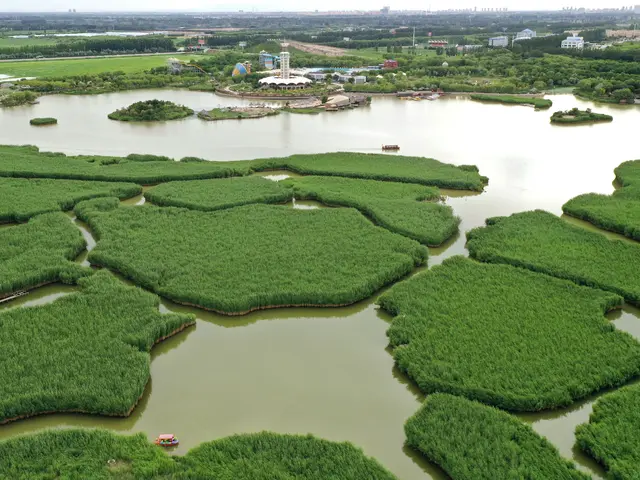File Photo: Aerial photo taken on June 25, 2020 shows the Mingcui Lake National Wetland Park in Yinchuan, northwest China's Ningxia Hui Autonomous Region. (Xinhua/Wang Peng)
On the edge of the vast Maowusu Desert in Lingwu City, northwest China's Ningxia Hui Autonomous Region, salt lakes of various sizes dot the sandy area.
The lakes are formed by the water discharged from the nearby collieries owned by Ningxia Coal Industry Group Co., Ltd under the state-owned China Energy. The water has to meet standards before it is released. From early April to late August each year, a group of "special guests" fly to the area: the Relict Gulls.
The black-headed, red-beaked migratory birds were discovered and recognized as a new species in the 1970s. In 2000, they were listed on the International Union for Conservation of Nature Red List of Threatened Species. China places the gulls under class one state-protected wild animals.
In Ningxia, the rare birds were never seen before 2016.
The gulls love to rest on the islets inside the lakes. Currently, they are breeding on the islets, with some birdlings already hatched. To protect their offspring, the adult gulls cover their nests most of the time.
"In May 2016, the staff of Ningxia's wetland protection and management center found more than 800 Relict Gulls over the lakes beside the coal mines on the Maowusu Desert," said Wei Hong, an engineer with the center. "It was the first time that the gulls were found in Ningxia."
The gulls have very strict requirements for their habitat. They like resting in open, plain areas, or in salt lakes in deserts and semideserts, and feed on aquatic insects. They only breed in islets inside the lakes.
"The salt lakes here are formed by standard mine water, and they are perfect for the gulls," Wei said. "There is little human interference, and after we discovered their existence, we sent people to conduct routine patrols."
For the company operating the coal mines, the arrival of the birds is both a surprise and a responsibility.
"We never thought that the mine water could attract the rare birds, and we need to protect their habitat," said Li Baoqiang, with the Ningxia Coal Industry Group Co., Ltd. "We supervise the quality of the mine water we discharge, and we also pay attention to the water levels in the lakes so that the islets stay a certain distance from the lake surface."
According to Wei Hong, the environment in the birds' habitat is so good that the number of gulls has increased rapidly. This year, they have observed more than 3,800 Relict Gulls. Besides, other birds, such as whooper swans, shelducks and black-winged stilts, have all flocked to the islets. The bird paradise has attracted bird watchers from a variety of places across China.
These days, the lakes have become a favorite place for the birds. However, as the lakes are rich in coal mines underneath, the area might become a place for mining in a few years. Last year, under the guidance of the regional wetland protection and management center, Ningxia Coal Industry Group Co., Ltd began building a wetland park not far from the lakes to help retain the gulls. The park has already attracted some gulls.
"The company discharges the mine water collectively and has formed a wetland of more than 1,333 hectares," said Li Baoqiang. "We also built a water project and grew a tree belt 5 km long and 20 meters wide." A wetland park management center was also established.
Li, who was a mine worker for a long time, is now tasked with protecting the birds with more than 20 other mine workers.
"Surveillance equipment has been installed around the wetland, and we take turns patrolling the area to prevent poaching or damaging the environment," Li said.
Li said that he did not recognize any of the birds in the past, but now that he sees them every day, he knows them better.
"Patrolling under the sun every day is not easy, but it makes me happy to see that the environment is getting better and the number of birds is increasing," he said.
 简体中文
简体中文

